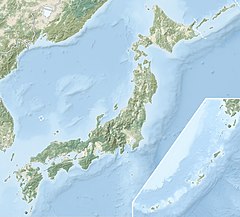Jinzū River
| Jinzū River Miya River (宮川, Miya-gawa, (upper reaches)) | |
|---|---|
 Jinzū River in Toyama Prefecture | |
 | |
| Native name | 神通川 (Japanese) |
| Location | |
| Country | Japan |
| Physical characteristics | |
| Source | |
| • location | Mount Kaore |
| • elevation | 1,626 m (5,335 ft) |
| Mouth | |
• location | Toyama Bay |
• coordinates | 36°45′42″N 137°13′19″E / 36.761787°N 137.222042°E |
| Length | 120 km (75 mi) |
| Basin size | 2,720 km2 (1,050 sq mi) |
| Discharge | |
| • average | 163.6 m3/s (5,780 cu ft/s) |
| Basin features | |
| River system | Jinzū River |
The Jinzū River (神通川, Jinzū-gawa or Jintsū-gawa or Jindzū-gawa) is a river that flows from Gifu Prefecture to Toyama Prefecture in Japan. The upper reaches of the river in Gifu are called the Miya River. It is 120 km (75 mi) in length and has a watershed of 2,720 square kilometres (1,050 sq mi).
Etymology
[edit]The official name for the river is "Jinzu Gawa" (written じんづうがわ (Jinzū-gawa or Jindzū-gawa)) according to the Geospatial Information Authority of Japan and Japan Coast Guard.[1] However, the pronunciation of the name has variations, including じんずうがわ (Jinzū-gawa) and じんつうがわ (Jintsū-gawa).[2][3]
Geography and development
[edit]The Jinzū River flows from a source at 1,626 metres (5,335 ft) on the slopes of Mount Kaore in Takayama, Gifu Prefecture and meets the Takahara River at the border between Gifu and Toyama Prefectures.[4] The upper reaches of the river in Gifu Prefecture are also called the Miya River (宮川, Miya-gawa).[4] From the border it flows generally north and empties into Toyama Bay on the Sea of Japan.[4] It's drainage basin covers an area of 2,720 square kilometres (1,050 sq mi).[4]
It once meandered through the city of Toyama, but the new waterway was constructed in the west of the city to avoid floods. Toyama City Hall and other governments are located on the reclaimed land of the old river.
Municipalities
[edit]- Toyama Prefecture
- Toyama (city)
Tributaries
[edit]- Ida River
- Kumano River
- Nagamune River
- Takahara River
Pollution
[edit]The river was polluted with cadmium due to mining and caused the itai-itai disease in the downstream towns around World War II.[5]
Legacy
[edit]The Japanese Navy cruiser Jintsū was named after this river.[6]
References
[edit]- ^ "Gazetteer of Japan 2021", p.29.
- ^ 神通川 [Jinzū River] (in Japanese). Kotobank. Archived from the original on 2 February 2024. Retrieved 2 February 2024.
- ^ 神通川 [Jinzū River] (in Japanese). Goo. Archived from the original on 2 February 2024. Retrieved 2 February 2024.
- ^ a b c d "Overview of the basin and rivers of the Jinzū River system" (2008), p.1.
- ^ 萩野病院(富山市)院長 青島恵子さん(71) 公害病の悲劇 次世代へ [Keiko Aoshima (71), Director of Hagino Hospital (Toyama City): Tragedy of pollution-related diseases, to the next generation] (in Japanese). Chunichi Shimbun. 6 July 2021. Archived from the original on 2 November 2021. Retrieved 2 February 2024.
- ^ Jentsura, Hansgeorg (1976). Warships of the Imperial Japanese Navy, 1869–1945. Annapolis, Maryland: Naval Institute Press. ISBN 0-87021-893-X.
Works cited
[edit]- 地名集日本2021 [Gazetteer of Japan 2021] (PDF) (in Japanese). Geospatial Information Authority of Japan and Japan Coast Guard. 2021. Archived (PDF) from the original on 17 December 2022. Retrieved 2 February 2024.
- 神通川水系の流域及び河川の概要(案) [Overview of the basin and rivers of the Jinzū River system (draft)] (PDF) (in Japanese). River Bureau, Ministry of Land, Infrastructure, Transport and Tourism. 21 February 2008. Archived (PDF) from the original on 19 September 2023. Retrieved 2 February 2024.

